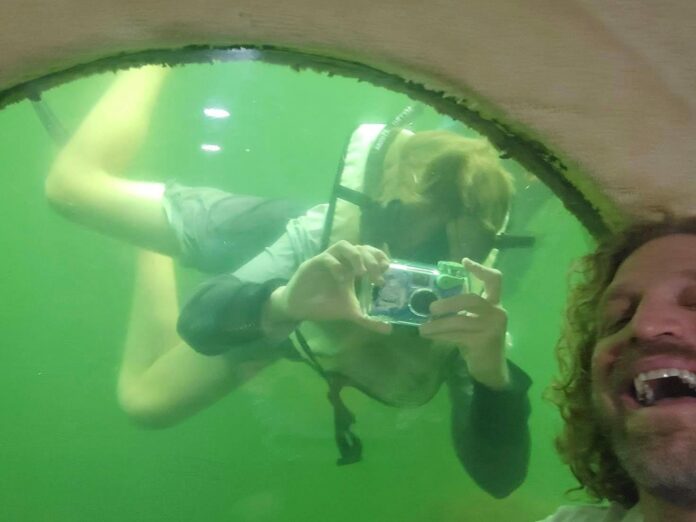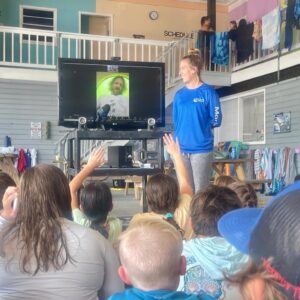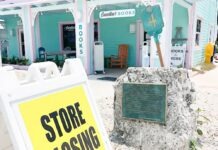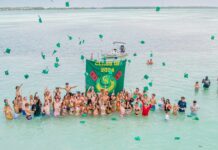
Coral Shores seniors Maggie Lavoie and Bella DiGiorgio, as well as their marine science teacher, Beth Rosenow, had an experience of a lifetime on April 12. Thirty feet underwater, the three learned from a scientist seeking to discover the mysteries of the ocean.
The two students, who will be succeeded by two other marine science students in the following week, have been invited to dive down to Jules’ Undersea Lodge in Key Largo for a 24-hour stay. The famous underwater hotel, which offers rooms to lucky scuba divers, is more than just a tourist destination. It is currently host to one of the most ambitious local science experiments in years, wherein a marine scientist seeks to live for 100 days in an underwater laboratory.
Joseph Dituri, an ex-Navy diver and a professor at the University of South Florida, was inspired to conceptualize Project Neptune after a call from filmmaker James Cameron’s dive team – following their Mariana Trench mission on the Deepsea Challenger – alerted him to their discoveries in the deepest parts of the ocean. In their findings, they discovered a sea louse whose DNA sample matched up as a partial cure for Alzheimer’s. Thrilled by their discovery, Dituri pursued his interest in marine research with renewed rigor.
“Everything we need is right here on this planet,” said Dituri. “We have the cures, we just have to find them.”
The idea for Project Neptune 100, the name for Dituri’s three-and-a-half month experiment in underwater living, coalesced after a series of similar research projects. He set his sights on Jules’ Undersea Lodge, a common hotspot for scientific research, relatively early on in his planning. In Project Neptune 5 several years back, he joined a team of four other researchers to study there for a week.
Inspired by talk of a manned mission to Mars, he decided that, in a 100-day stay, he would try to gain valuable insights in the science of isolation and extreme environments through constant psychological and physiological testing, as well as try to better understand how the human body reacts to high-pressure environments.

Throughout his stay, he will complete more than a dozen psychological and psychosocial tests, as well as countless blood, urine and saliva analyses, and frequent electroencephalograms, pulmonary function tests and blood pressure monitoring in order to gain an unprecedented understanding of the body’s reaction to deep-sea environments.
“It will be the most comprehensive blood test that’s ever been done on a deep-sea diver,” Dituri said. Additionally, he will study new technologies with boundless future potential.
“I’m testing an AI program that will kind of act like a tricorder from ‘Star Trek,’” Dituri said. “It will tell you what’s wrong (with your body), and where (that problem) is located.”
Despite being mostly alone for his stay, Dituri is frequently visited by fellow researchers and by students. Student divers will learn and participate in scientific studies with Dituri in the undersea lodge, and many schools have scheduled talks with him via Zoom.
“By the time that the mission ends, we anticipate that Dituri will have interacted with around 2,000 students,” said Kim Gregory, director of development at MarineLab. Dituri sees educational outreach as an important part of his mission.
“I want to make science cool,” Dituri said. “Science is about more than beakers, microscopes and white coats. Students can get out in the field and make a difference.”
Also supporting Dituri is a team of more than 100 fellow researchers, scientists and health experts. His project is financially supported by MarineLab, the International Board of Undersea Medicine and the Marine Resources Development Foundation.
Even though he’s largely cut off from the outside world, Dituri consistently finds awe and beauty in his surroundings. “Just today I watched lobsters molt,” he said. “I’m watching stuff that people never get to see.”
Although similar research has been conducted at the Jules’ Undersea Lodge before, Dituri’s project is unmatched in terms of its strict scientific focus and immense scope. In 2014, for example, two researchers broke the world record for longest time spent underwater during their 73-day stay at the lodge. But their research failed to truly explore the effects this undersea living has on the human body. Dituri’s stay, which began March 1, is scheduled to conclude on July 9.





















